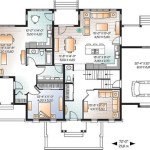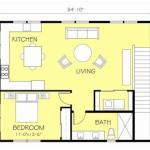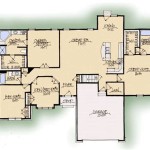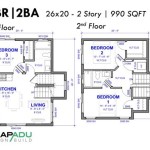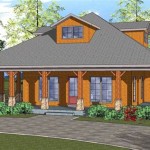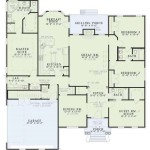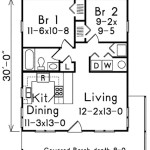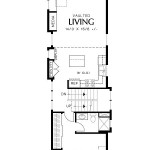House Plans With Bedrooms in Basement
House plans with bedrooms in the basement can be an excellent option for those seeking additional living space or private areas in their home. There are numerous advantages to incorporating bedrooms in the basement, including increased privacy, reduced noise levels, and the potential for creating a dedicated living space for family members or guests. While designing a basement bedroom, specific considerations must be taken into account for building codes, safety, and comfort.
Building Code Requirements
Basement bedrooms must comply with local building codes to ensure safety and habitability. These codes typically specify minimum requirements for egress, natural light, ventilation, and ceiling heights to ensure adequate living conditions. Before finalizing your plans, it's crucial to consult with local building authorities to determine the specific regulations that apply in your area.
Safety Considerations
Safety should be a top priority when designing a basement bedroom. Proper egress is essential in case of emergencies such as fires or other hazardous situations. Basement bedrooms must have at least two means of egress, either through windows meeting specific size and height requirements or through an approved secondary exit, such as a door that leads directly outside or to a safe area within the home. Adequate ventilation is also crucial to prevent moisture buildup and ensure good air quality. Incorporating proper insulation and moisture control measures is essential to create a healthy and comfortable living environment in the basement.
Comfort and Design Considerations
Aside from safety and technical requirements, comfort and design should also be given due attention when planning a basement bedroom. Natural light can significantly enhance the livability of a basement bedroom. Consider installing large windows or incorporating light tunnels to bring natural light into the space. Artificial lighting should be carefully planned to create a bright and welcoming atmosphere. Good ventilation is essential to prevent musty odors and maintain a comfortable indoor climate. Incorporating a ceiling fan or installing an air purifier can help improve air circulation and reduce humidity levels.
Layout and Functionality
The layout of the basement bedroom should prioritize functionality and maximize space utilization. Sufficient space for comfortable movement, furniture placement, and storage is crucial. Consider including built-in storage solutions such as closets or drawers to organize belongings and maintain a clutter-free environment. The placement of windows and doors should also be carefully considered to ensure privacy and natural light while maintaining a comfortable layout for the bedroom.
Conclusion
Incorporating bedrooms in the basement can provide valuable additional living space, privacy, and a dedicated area for family members or guests. By carefully considering building codes, safety measures, and comfort and design factors, you can create a functional and inviting basement bedroom that meets your needs and preferences. Whether you're seeking a quiet retreat, a private guest room, or an extended living area, a well-designed basement bedroom can enhance the functionality and enjoyment of your home.

House Plans Floor W In Law Suite And Basement Apartement

Cost Effective Craftsman House Plan On A Walkout Basement 25683ge Architectural Designs Plans

Small Cottage Plan With Walkout Basement Floor

Stylish And Smart 2 Story House Plans With Basements Houseplans Blog Com

Hugedomains Com Basement House Plans Floor Layout

Don Gardner Walkout Basement House Plans Blog Eplans Com

Walkout Basement House Plans To Maximize A Sloping Lot Houseplans Blog Com

Walkout Basement House Plans Farmhouse Hillside

House Plan 5 Bedrooms 3 Bathrooms 3912 V1 Drummond Plans

Walkout Basement House Plan For Sloping Lot

